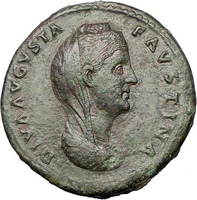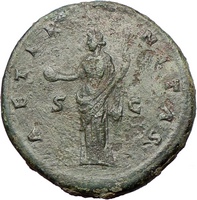Faustina I Roman Empress Antoninus Pius wife Ancient Coins Numismatic
Investment
Buy coins of
Faustina I Roman Empress. Every coin comes with it's own
custom-made, unique certificate of authenticity $50-$100 value,
absolutely free, a lifetime guarantee of authenticity, professional
research photograph and history.
Find out for yourself what over 10,000 other satisfied customers say
about their experience and start your ancient coin collection today.
 
Example of Authentic Ancient
Coin of:
Faustina I - Roman Empress Wife of Roman Emperor
Antoninus Pius
POSTHUMOUS After Death Christian Deification Issue.
Bronze Sestertius Struck at the mint of Rome circa 141-146
A.D.
Reference: RIC 1108 (Antoninus Pius), C 37
DIVAAVGVSTA FAVSTINA - Veiled, diademed, draped bust right.
AETERNITAS - Providentia standing left, holding globe and scepter.
In
Roman mythology, Providentia was
the
goddess of forethought. Providentia.
(Providence).----With all their vices, follies, and gross superstitions
(indeed, in spite of them), the Romans still appear to have cherished a
belief in the perpetual and direct interposition of the gods with
respect to human affairs.----Among the various monuments which attest
this religious feeling, or at leas this profession of religion, on the
part of both princes and people, none are more conspicuous than those to
be found on their imperial coins, for it is to be observed that
previous to the substitution of the monarchical for the republican form
of government, that allegorical divinity whose name is derived from
providere (to foresee) is not seen either on metal or on marble.
Annia Galeria Faustina, more familiarly
referred to as Faustina the Elder (Latin:
Faustina Major; born
September 21 about 100, died
October or November 140), was
 a
Roman Empress and wife of
Roman Emperor
Antoninus Pius. a
Roman Empress and wife of
Roman Emperor
Antoninus Pius.
Faustina was the only known daughter of consul and
prefect
Marcus Annius Verus and
Rupilia Faustina. Her brothers were
consul
Marcus Annius Libo and
praetor
Marcus Annius Verus. Her maternal aunts
perhaps were Roman Empress
Vibia Sabina,
Matidia Minor. Her paternal grandfather
had the same name as her father and her maternal grandparents possibly
were
Salonina Matidia (niece of Roman
Emperor
Trajan) and suffect consul
Lucius Scribonius Libo Rupilius Frugi Bonus.
Faustina was born and raised in
Rome.
As a private citizen, she married Antoninus Pius
between 110 and 115. Faustina and Antoninus had a very happy marriage.
Faustina bore Antoninus four children, two sons and two daughters. They
were:
-
Marcus Aurelius Fulvius Antoninus (died before
138); his sepulchral inscription has been found at the Mausoleum of
Hadrian in Rome.
-
Marcus Galerius Aurelius Antoninus (died before
138); his sepulchral inscription has been found at the Mausoleum of
Hadrian in Rome. His name appears on a Greek Imperial coin.
-
Aurelia Fadilla (died in 135); she married Aelius
Lamia Silvanus or Syllanus. She appears to have had no children with
her husband and her sepulchral inscription has been found in
Italy.
-
Annia Galeria Faustina Minor or
Faustina the Younger (between
125-130-175), a future Roman Empress; she married her maternal
cousin, future Roman Emperor
Marcus Aurelius. She was the only
child who survived to adulthood.
On
July 10,
138, her uncle emperor
Hadrian had died and her husband became
the new emperor. Antoninus was Hadrian's adopted son and heir. Faustina
became Roman Empress and the senate accorded her the title of
Augusta. Faustina as an empress was
well respected and this beautiful woman was renowned for her wisdom. The
Augustan History impugned her
character, criticizing her as having "excessive frankness" and "levity".
However, this doesn’t appear to be the case with her character.
Throughout her life, Faustina as a private citizen and an empress was
involved in assisting with charities, assisting the poor and sponsoring
and assisting in the education of Roman children, particularly of Roman
girls.
She can be viewed as one of the most moral, stable
and respected empresses in the history of the
Roman Empire. When Faustina died,
Antoninus was in complete mourning for Faustina.
Antoninus did the following in memory of his loving
wife:
-
Deified her as a goddess (her
apotheosis was portrayed on an
honorary column)
-
Had
a temple built in the
Roman Forum in her name, with
priestesses in the temple.
-
Had various coins with her portrait struck in her
honor. These coins were inscribed DIVA FAVSTINA
("Divine Faustina") and were elaborately decorated.
-
Founded a charity called Puellae Faustinianae
or Girls of Faustina, which assisted orphaned girls.
-
Created a new alimenta (see
Grain supply to the city of Rome).
In 2008, archaeologists digging at the ancient site
of
Sagalassos in
Turkey discovered a colossal marble
head which is believed to be that of Faustina.
|